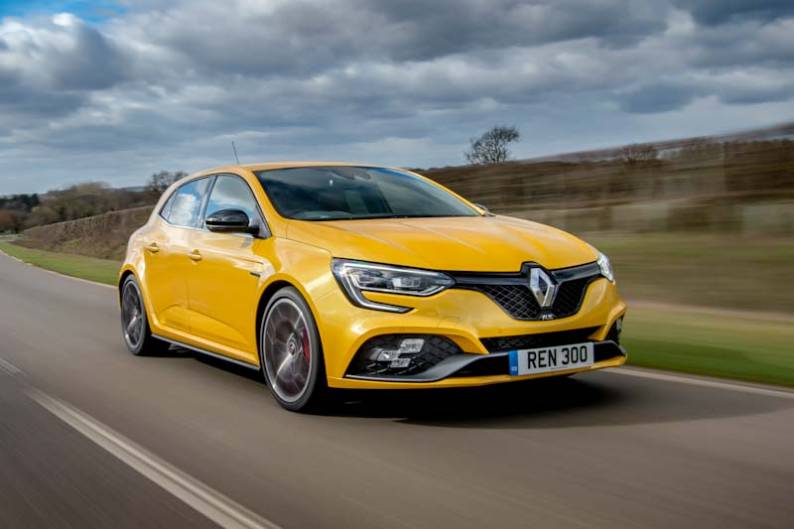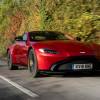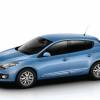
RAC sale – up to 33% off*
• Roadside cover from £5.29 a month†
• We get to most breakdowns in 60 mins or less
• Our patrols fix 4/5 breakdowns on the spot

By Jonathan Crouch
Introduction
Renault retained its place amongst the hot hatchback elite with this third generation Megane R.S. model, introduced in 2018. The headlines here included the addition of a 4Control 4-wheel steering system, plus a more powerful 1.8-litre engine putting out at least 280bhp. There was a five-door body style for this MK3 model and initially, buyers chose between manual or paddleshift auto transmission. Plus there was a stiffer 'Cup Chassis' set-up for those wanting it, along with a track-tamed 'Trophy' version at the top of the range. It all gave this car wider appeal when new. How does it stack up as a used buy?
Models
5-door hatchback 1.8 [petrol]
History
Some GTi models are merely fast versions of the existing hatches they're based upon. Renault though, pioneered the concept of bespoke development of a car of this kind - and it's paid dividends. Most powerfully with the two Renaultsport Megane models introduced respectively in 2003 and 2009. This MK3 contender, launched in 2018, was based on the fourth generation Megane design and was tasked with continuing the brand's distinguished hot hatch heritage.
The headline news here was the introduction of 4-wheel steering for the first time on a car of this kind, but there was also much else to catch the eye. Special shock absorbers incorporate secondary damping for optimum tyre-to-tarmac contact. And there was the option of a stiffly-sprung 'Cup chassis' that'll suit those likely to regularly take this car on track. The previous 2.0-litre engine made way for a lighter but more powerful 280hp 1.8-litre turbo unit featuring F1-style fettling - also available in uprated 300hp form in the top 'Trophy' variant. And, unlike with the smaller Clio R.S. model, from launch at least, there was manual transmission as an alternative to the EDC paddleshift auto transmission that most customers chose.
The previous car's brilliant 'PerfoHub' independent steering-axis front suspension system was carried forward so that all that power through the front wheels didn't corrupt the steering. There was also an uprated set of Brembo brakes, Launch Control on the auto model, a piercing R.S. Vision' lighting system and the option of in-car 'R.S. Monitor' telemetry so that customers could analyse real-time performance as they drove. The car got a light facelift in 2020, at which time the auto gearbox has made mandatory. And the RS Megane disappeared from the price lists in mid-2022.
What You Get
Some previous Renaultsport products have looked rather 'Max Power', a boy racer image that customers with more to spend would generally rather avoid. Hence, with this third attempt at R.S. Megane design, a car that was classier than anything the French brand had yet provided to the hot hatch market.
There's certainly a pretty menacing front end, one dominated by a wide front bumper intake incorporating the Gun Metal Grey-painted F1-style front blade that's supposed to reference the brand's involvement in Grand Prix racing. As does the R.S. Vision LED lighting system's 'chequered flag-style' lower lamp design that this styling element flows out into.
At the wheel, the driving position's brilliant, the supportive sports seat placing you perfectly in front of a grippy leather-trimmed three-spoke R.S. wheel. Through it, you view a 7-inch instrument cluster screen that usually prominently displays a rev counter and a digital speedo. Pressing the 'R.S. Drive' button at the base of the centre stack delivers a red theme, both to this display and that of the central portrait-style touch screen. As well as the usual media, navigation and informational functions, this centre-stack 'R-Link 2' display allows you to access what was a key option for this car, the 'R.S. Monitor', a telemetry tool with the kind of read-out menu that presumably Renault's engineering team must peruse in the F1 pit lane. Here, there's digital and graphical feedback on almost every dynamic element, as well as track tips and a lap timer. An additional unique 'R.S. Monitor Expert' feature will even let you film your driving sessions, then overlay the footage with telemetry data and share it over social media. If that's your thing.
And in the back? Well here of course is where you'll most appreciate this generation model's switch from coupe to five-door body style. We had quite high expectations here, given the standard Megane donor model's relatively lengthy wheelbase and the fact that it's one of the widest cars in its class. In the event, accommodation in the rear is quite tight, despite Renault's insistence that there's more shoulder room than most rivals can offer. At least you can accommodate three adults across the back if need be - something that annoyingly isn't possible in a rival Honda Civic Type R. As you'd expect, cargo room is much more generous than was the case with the previous coupe model, capacity having risen from 344 in the previous generation model to 434-litres.
What You Pay
Please fill in the form here for an exact up-to-date information.
What to Look For
Obviously with a super hot hatch like this, you want to try and steer clear of examples that have been thrashed on a track or led an unduly harsh life. As usual, inspect the alloy rims for scratches and insist on a full service history. Using high-octane petrol as well as good quality oils (Ester synthetic is worth seeking out) will be worth the extra expense in the long term. You do need to choose the right Renault dealer as apparently, they're not all kindly disposed towards RS models. Front tyres get worn quite quickly, as you might expect - 8,000 miles would be typical, compared to over twice that on the rears. Brake discs are expensive (relative to RS Clios anyway).
Replacement Parts
(approx based on a 2020 Megane R.S. - Ex Vat) An oil filter is in the £4 bracket. Brembo front brake pads cost in the £32 bracket; Brembo rears are in the £22-£45 bracket. Rear brake discs cost in the £54 to £80 bracket . A wiper blade is around £4-£13. And a starter motor is around £160.
On the Road
Much changed here compared with the previous generation model and it's mostly all brilliant. Under the bonnet, there's what at launch was the world's most powerful 1.8-litre engine delivering 280hp and 390Nm of torque. There's also an even more focused top 'Trophy' version with 300hp. Either way, there's the option of manual or paddleshift auto transmission. In the manual standard model, 62mph from rest takes 5.8s en route to a 158mph maximum. You'll be able to get all that grunt onto the tarmac a little more easily thanks to standard '4CONTROL' four-wheel steering. As usual with these sorts of systems, the rear wheels steer slightly in the opposite direction to the fronts at low speeds to shorten the turning circle. And slightly in the same direction as the fronts at higher speeds to improve cornering stability. What's different here though, is that you can alter the changeover point between the two settings, normally fixed at 37mph. In its most focused 'Race' mode, this car will counter-steer its rear wheels all the way up to 62mph, which 'pivots' the car into tight corners at speed with a directness that'll initially surprise you until you learn to apply a little less lock to compensate.
What else? Well two different types of chassis were offered - 'Sport' or 'Cup'. The straightforward 'Sport' chassis we'd recommend provides easy sporty driving, with impressive ride compliance thanks to special rally-derived all round hydraulic bump stops that also enable optimum control of tyre-ground contact. The 10% stiffer Cup chassis offers greater, more focused performance for track and fast road use and includes a Torsen Limited Slip Differential for greater cornering traction. If you favour the 'Cup' variant, you're the kind of buyer who'll probably be interested in the 'R.S. Monitor' telemetry system that gives you real-time performance data as you drive. You might also like the 'R.S. Monitor Expert' option that allows drivers to film their track sessions and overlay telemetry data to create augmented reality videos that can later be analysed on a provided 'R.S. Replay' website.
Overall
Renaultsport may be a division of the Renault group, but the cars it produces are so different - and so much more rewarding - than their standard counterparts that they could be from another maker entirely. Which is refreshing in an age where so many brands' idea of creating a hot hatch is to plumb-in a bigger engine, bolt-on a bodykit and jack-up the price.
Bottom line with this improved Megane R.S. is that for the price of a mere hot hatch, you get a super shopping rocket, unafraid of the fastest GTi's out there, even if they do cost more. Plus all of those cars are essentially compromises between track-ready handling and roadgoing usability: with its 'Sport' and 'Cup' model options, this RS doesn't have to be. Either way, it's brilliant fun - and that's what a car like this really should be all about.
And in summary? Well, other hatches in the class are more powerful than this one, but none are faster where it matters. The 4-Wheel Steering system adds another dimension to this car's talents but ultimately, they remain as purely race-bred as they've always been. Bottom line? Renault's Dieppe division has delivered.







